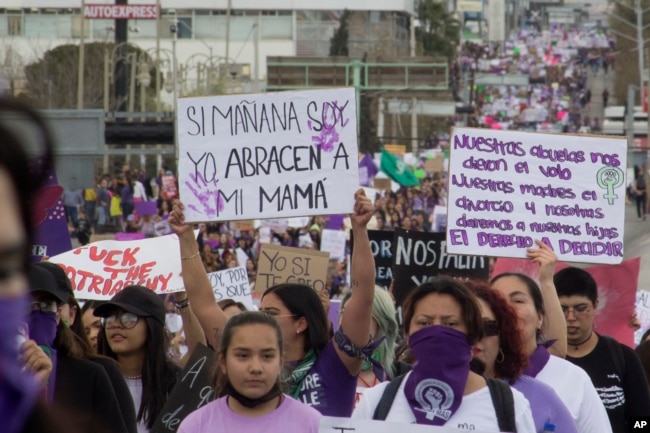Mexican Activists Help US Women Get Abortion

Marcela Castro’s office in Chihuahua is more than 150 kilometers from the United States-Mexico border. But the distance does not prevent her from assisting women in the U.S. to go around the recent bans on abortion, a medical procedure to end a pregnancy.
Castro and her coworkers work for Marea Verde Chihuahua. The organization of mostly volunteers has supported reproductive rights in northern Mexico since 2018. They provide virtual guidance and abortion pills for women who want to end a pregnancy on their own.
Their abortion model requires no travel, health center visit, or prescriptions. It was developed by Mexican activists through many years of facing abortion bans and restrictions in Mexico. The organization does not charge for the help they provide. And the model gained interest in the U.S. as the Supreme Court overturned Roe v. Wade to end the constitutional right to abortion last year.
Castro and her coworkers are trained “acompañantes.” They can safely advise women on self-administered medical abortions. And they serve as a guide and partner, in person or from a distance. They have studied national abortion guidelines and they fully know the medical procedures established by the World Health Organization (WHO).
“We don’t offer medical attention because we are not doctors,” Castro said. “Although it is a medical procedure, it does not require hospital measures.”
Most women from the U.S. contact Marea Verde Chihuahua through social media or are introduced by someone. Most communicate in Spanish, though the “acompañantes” could also assist English speakers as well. Communication usually is conducted via a mobile and secure tool, WhatsApp.
In most cases, medication is advised and the “acompañante” provides a combination of two drugs, misoprostol and mifepristone, to end the pregnancy. They are both considered safe by the WHO and the U.S. Food and Drug Administration.
The work of the “acompañantes” troubles anti-abortion activists in Mexico. One of them, Jahel Torres of a national group called Pasos por la Vida, suggested there were health risks because abortion pills were given by non-medical workers. However, the WHO’s guidelines show self-administered abortion as a safe option.

Women hold signs against gender-based violence and in favor of abortion on International Women's Day, in Chihuahua, Mexico on March 8, 2023. (AP Photo/Adriana Esquivel)
Increased requests
John Seago is president of Right to Life in the U.S. state of Texas. The organization is pushing for new legislation to punish those breaking Texas law by helping people receive abortions. He said there has yet to be any strong effort to bring legal action against those involved with supplying abortion pills to people who live in Texas.
“Texas simply does not have enough policy tools to efficiently stop these practices,” Seago said.
Nathan Cortez is a professor of health law at Southern Methodist University in Dallas, Texas. He said he expected that women in states with abortion bans would consider getting help from outside the U.S.
Las Libres is an organization founded 20 years ago in the Mexican state of Guanajuato, where abortion is still banned. It is led by activist Veronica Cruz. And it began training acompañantes since 2019.
“In January 2022, we had an average of 10 cases every day. When Roe was overturned, in June, we had up to a hundred,” Cruz said.
She said the numbers kept rising until they reached 300 requests per day, all from the U.S. The workload was so large for her team of 10 people, so she created new networks to help.
“In one year we created more than 20 networks. We are about 200 people helping only the United States,” Cruz said.
Words in This Story
abortion – n. a medical procedure used to end a pregnancy and cause the death of the fetus
prescription – n. a written message from a doctor that officially tells someone to use a medicine or therapy
administer – v. to give (a drug, medicine, or treatment) to someone
efficient – adj. capable of producing desired results without wasting materials, time, or energy
Mexican Activists Help US Women Get Abortion (voanews.com)